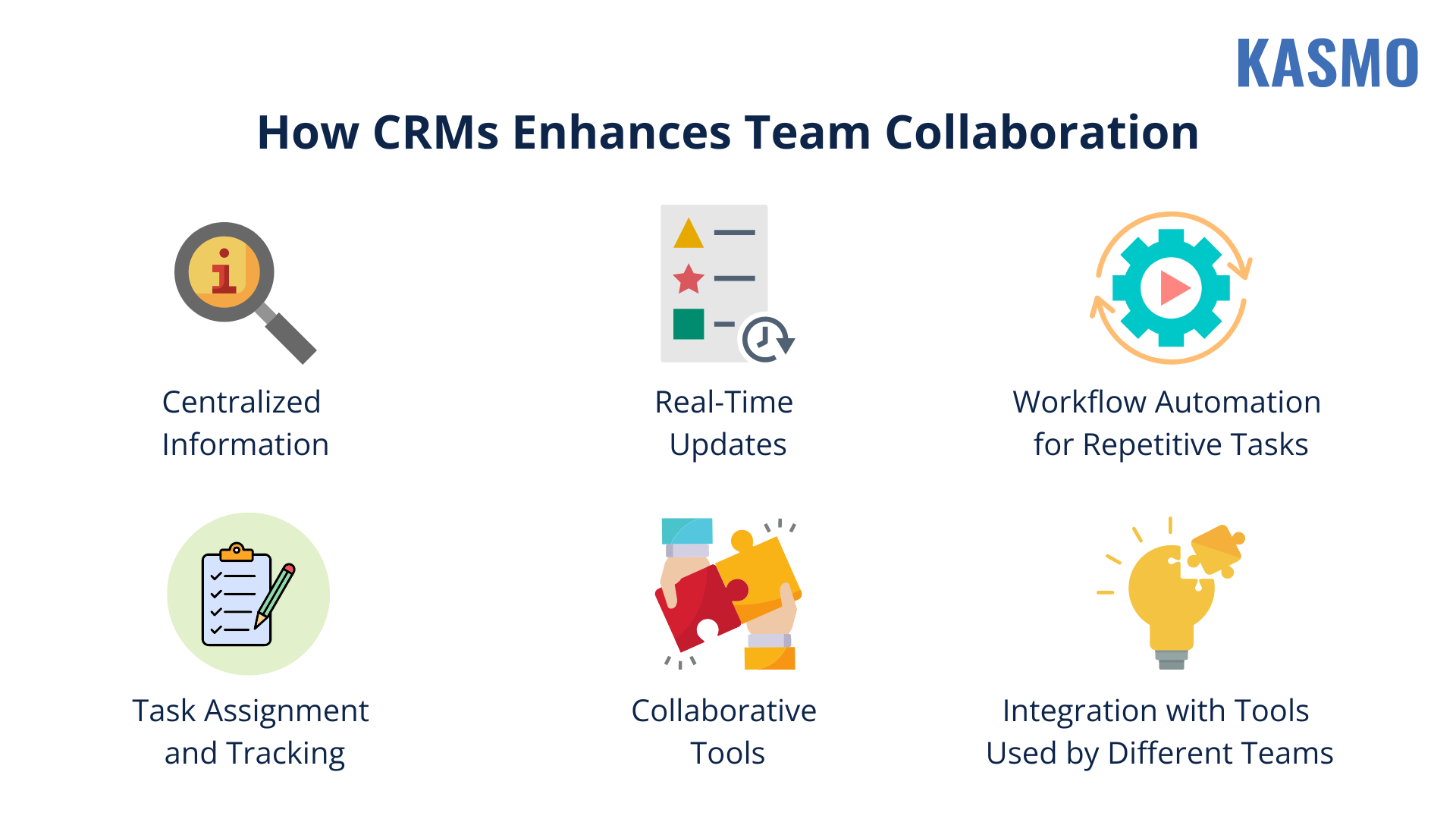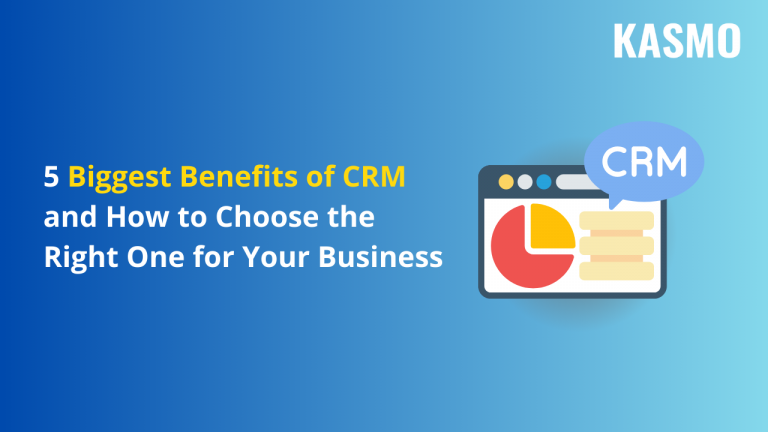Once you start working with a CRM platform, it’s hard to image a world without it. The vast benefits of CRM software have made it a part and parcel of most thriving businesses today. With the enormous amounts of customer and sales data available with organizations, structure and organization play a key role in being able to derive value out of the information that you possess. Managing customer relationships are easier when you have everything you need – data, trends, metrics, and more in one place – accessible anytime.
A CRM platform helps businesses to target different audiences and effectively manage interactions with current and potential customers. CRM integrates data from different customer touchpoints, set scores and alerts based on an individual lead or customer’s activity, and enables to better manage customer relationships. If you aren’t already leveraging a CRM tool, your competitors most likely already are, giving them an edge in building better customer relationships.
In this blog we cover the five greatest benefits of CRM, why you should consider investing in one, and with so many options of CRM software in the market, how to choose the best one?
Benefits of CRM for Companies of Every Size
Irrespective of whether you are a small business or an enterprise, a CRM software benefits organization of every size. Let’s explore the aspects of your business that a CRM can improve:
Credible Data and Reporting
Large volumes of data are available at multiple touchpoints for businesses today that can be leveraged for actionable insights and business growth. But what really makes data useful and trustworthy? When data is cleaned, sorted, and analyzed from verifiable sources, it has the power to uncover valuable insights. While social media and website traffic analytics tools give you metrices from the respective platforms, a CRM system helps you delve deeper into the available data and metrics, including those from other sources.
One of the key advantages of a CRM is that you can see who interacts with your company and how. Such deep-dive into data allows to understand how well you are interacting with leads and customers, and even track the trends in your sales and customer service efforts.
Dynamic content and Automated Messaging
The data at disposal through a CRM platform gives you the power to personalize messages and outreach efforts. It allows you to categorize similar traits or a particular user behaviour into different drip campaigns. Another key benefit of a CRM is that it lets you set up a series of automated mail that are triggered by specific user actions.
For example, if user has multiple items added to cart and has not checked out or completed the buying journey, a drip campaign can be shared to encourage them to complete the buying journey. This feature makes your marketing and outreach efforts speak to you customers through dynamic content and automated messaging. Users can also be removed from drip campaign based on any preset triggers of action. In this instance, if the user has made the purchase of the items in cart, then they can be removed from the drip campaign in order to avoid redundancy in emails.
Enhanced Productivity and Proactive Service
Automation and accessibility of data drives employee productivity and also enables your organization to have a proactive rather than a reactive approach to building customer relationships. Using the advanced analytics available on the CRM platform, marketing teams can easily create more campaigns that resonate with the audience while the sales team gains a deep-understanding of what interests the customer the most and can focus on selling right the prospective customers. It saves your team considerable time that they would otherwise spend on gathering the right information on customers. Furthermore, when customers receive proactive communication and services, it can result in customer delight and better chances of conversion.
Streamlined Team collaboration

By consolidating customer data, interactions, and notes in one place, a CRM provides a centralized hub where team members can access information easily. This ensures everyone is on the same page and reduces the need for back-and-forth communication to gather necessary details. With cloud-based CRMs, updates made by one team member are instantly visible to others. This real-time synchronization ensures that everyone has access to the latest information, enabling swift decision-making and coordination. Also, Many CRMs offer workflow automation capabilities, which streamline repetitive tasks and standardize processes. By automating routine activities, team members can focus on more strategic initiatives and collaborate more effectively on complex projects. Some of the other notable benefits of CRM include easy integration with other tools, workflow automations, and easy task assignment and tracking. It acts as a catalyst for team collaboration by providing a centralized platform for information sharing, real-time updates, task management, collaborative tools, workflow automation, and integration with other tools.
Dashboards the Visually Showcase Data
CRM systems offer dashboards that visually showcase real-time data through customizable displays, including charts and graphs, facilitating quick interpretation of key performance indicators (KPIs) and trends. With drill-down capabilities, users can explore specific metrics in detail, enabling deeper analysis and informed decision-making. Comparative analysis tools allow users to benchmark performance and track progress over time or across different segments. Mobile accessibility ensures that users can access critical insights anytime, anywhere, enhancing agility and responsiveness. Overall, CRM dashboards provide a powerful tool for monitoring performance, identifying opportunities for improvement, and driving business success through data-driven decision-making.
Custom dashboards feature allows you to set up specific performance metrics that need to be showcased to different shareholders. For instance, a marketing head would be more interested to see the metrices such as CTR, CPC, conversions etc. whereas a sales head would want data that represents deal closures, active conversations, demos scheduled etc.
Choosing the Best CRM that is Tailored to Your Business Needs
Many CRM software are available in the market today, and choosing one that suits the needs of your company requires several careful considerations. While comparing CRM systems can be overwhelming with plenty of platform options and features, here are some features and benefits of CRM to keep in mind while choosing the ideal solution for your business.
-
Scalability
One of the key considerations while choosing the best CRM is to understand whether the tool has the capability to scale as your business grows. Your CRM should ideally not just cater to your current needs but should be scalable irrespective of the size of business. Look for a platform that is designed for growth such as additional storage, user logins, and reporting tools that can support your growing needs.
-
Customization
The ‘One size fits all’ is not practical when implementing a CRM for your business. No two businesses are alike, find a CRM that is customizable to your specific needs. For instance, does the tools allow you to customize your sales reports or add custom fields to your contact database?
-
App Integration
CRM are powerful tools that can uncover several deep insights when integrated with your other internal tools and software. Most CRM integrate with other apps, tools, and platform which facilitate easy data sharing and automation of tasks.
-
Pricing
Price comparison of CRMs is often not straightforward. This makes it one of the most crucial factors that businesses must evaluate. Weighing the features and the associated pricing for each platform must be done carefully. While some platforms may offer a discounted price, the associated features might be much lower than what your business needs. Affordable plans often come with limit storage and number of contacts. It is important to consider a CRM tool that provides the features that are most important for your business while not burning a hole in your pocket.
-
Ease of use of user experience
When selecting a CRM, ease of use and user experience are paramount considerations. A CRM system that is intuitive and user-friendly ensures quick adoption across your team, minimizing training time and maximizing productivity. A seamless user experience encourages consistent utilization of the CRM, leading to more accurate data entry and better insights. Additionally, an easy-to-navigate interface enhances overall efficiency, allowing users to focus on their tasks rather than struggling with the software. Ultimately, prioritizing ease of use and user experience in CRM selection enhances user satisfaction and drives better outcomes for your business.
Why Choose Salesforce?
Salesforce stands out as the ultimate CRM solution with advanced features that support scalability, customization and seamless app integration. It scales with your business’s growth, adapts to your unique needs through customization, and seamlessly integrates with other tools for enhanced productivity. Its transparent pricing ensures you get the features you need without breaking the bank. With Salesforce, businesses can streamline operations and drive success with ease.
The Takeaway
CRM systems serve as important tools for modern businesses, offering a myriad of advantages. They act as centralized hubs for key customer data, facilitating robust client relationships through tailored interactions and efficient service provision.
By optimizing lead management and enabling precise targeting in marketing campaigns, CRMs drive better sales performance and revenue generation. Through the implementation of automation features, these systems streamline operational processes, allowing organizations to allocate resources more effectively. Moreover, real-time access to data empowers informed decision-making, fostering agility and responsiveness.
Additionally, CRM systems foster collaboration among teams, promoting synergy and enhancing productivity across departments. Their scalability and adaptability ensure sustained relevance and competitiveness in evolving market conditions, positioning businesses for long-term success.

